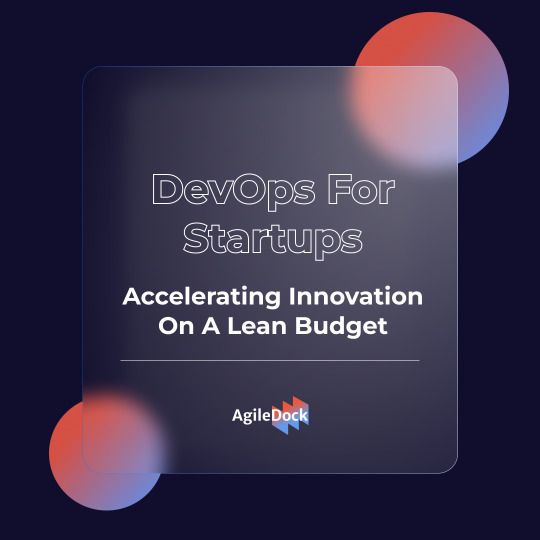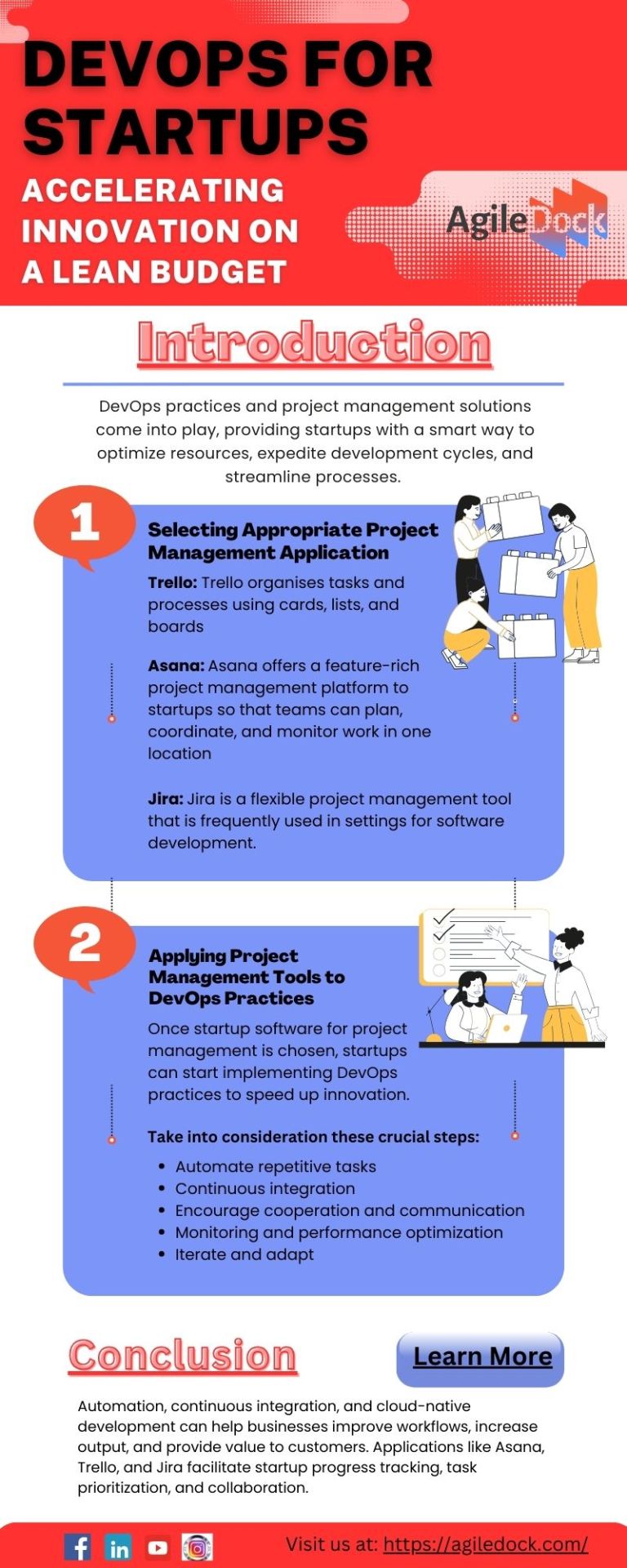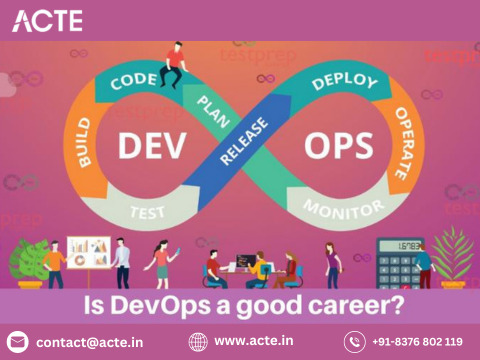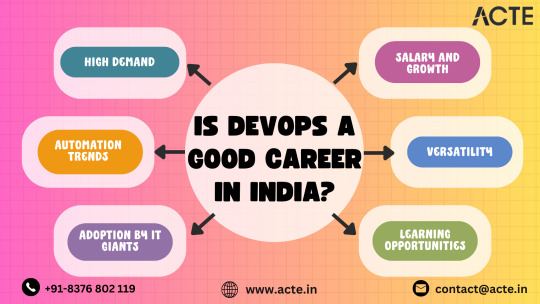#devops practices startups
Explore tagged Tumblr posts
Text

Navigating DevOps Practices in Startup Ventures
Delve into the strategies and project management solutions powering successful startup journeys. Explore how innovative DevOps practices enable efficient resource allocation, seamless collaboration, and accelerated time-to-market, propelling emerging companies towards sustainable growth and market leadership. Visit here - https://bit.ly/3vJt7Rj
#project management software#project management solution#project management tool#DevOps practices#devops practices startups
0 notes
Text

Elevate Your Startup Journey With Agilledock Guide on DevOps Practices
Dive into the world of DevOps practices tailored for startups with AgileDock's innovative solutions. Learn how their project management software and tools streamline operations, optimize resources, and drive rapid innovation, all within budget constraints.
#project management software#project management solution#project management tool#devOps practices#devops practices startups
0 notes
Text
Transforming Businesses with DI Solutions: Innovative IT Expertise
Transform your business with DI Solutions

In the ever-evolving digital landscape, businesses must harness cutting-edge technology to remain competitive. At DI Solutions, we specialize in driving business transformation through advanced IT solutions and expert services. Our dedication to innovation and excellence has empowered numerous clients to achieve their goals and excel in their industries.
Innovative IT Solutions DI Solutions excels in providing tailored IT solutions that meet each client's unique needs. Our services include custom software development, mobile app creation, web development, and UI/UX design. By leveraging the latest technologies, we deliver state-of-the-art solutions that enhance growth and efficiency.
Expert Team of Professionals Our team consists of highly skilled professionals—creative designers, experienced developers, and strategic problem-solvers. We emphasize continuous learning to stay at the forefront of industry trends and technological advancements, ensuring that our clients receive the most effective and innovative solutions.
Global Reach and Impact
With over a decade of experience, DI Solutions has made a significant impact globally, partnering with more than 120 clients across North America, Europe, Asia, and Australia. Our extensive global presence demonstrates our capability to provide exceptional IT services that address diverse business needs.
Client-Centric Approach
At DI Solutions, clients are central to our mission. We take the time to understand their business objectives, challenges, and requirements, enabling us to deliver customized solutions that surpass expectations. Our client-centric approach ensures we provide not just what is needed but what drives success and growth.
Comprehensive IT Services
Our service offerings include:
Custom Software Development: Tailored software solutions for optimal efficiency and performance.
Mobile App Development: Innovative mobile applications for Android and iOS platforms.
Web Development: Expert web development to create responsive and user-friendly websites.
UI/UX Design: Engaging user interfaces that enhance the overall user experience.
Quality Assurance: Rigorous testing to ensure the highest quality standards.
DevOps Services: Streamlined operations through integrated cultural philosophies, practices, and tools.

Join Hands with DI Solutions
Partner with DI Solutions to harness the power of innovative IT expertise. Whether you’re a startup aiming to establish a presence or an established business seeking new heights, we have the solutions and expertise to propel you forward.
For more information, visit our website or contact us directly. Let’s embark on a journey of transformation and growth together.
Transform your business with DI Solutions – where innovation meets excellence.
Contact Us Website: https://disolutions.net/ Email: [email protected] , Call: 91-9904566590 , B-301, 307, 406 Apex Commercial Center, Varachha Road, Nr. Yash Plaza, Surat, Gujarat,India-395006.
youtube
#disolutions #DI Solutions #Hire Angular.js Developers #Hire React.js Developers #Hire Vue.js Developers #Hire UI/UX Developers #Hire .NET Developers #Hire Node.js Developers #Hire Laravel/PHP Developers #Hire Android Developers #Hire IOS Developers #Hire Ionic Developers #Hire React Native Developers #Hire Full Stack Developers #Hire MERN Stack Developers #Hire MEAN Stack Developers #Mobile App Development #Web Development #UI/UX Design #Quality Assurance #DevOps Services
2 notes
·
View notes
Text
Mastering DevOps: A Path to Tech Leadership and Innovation
In the ever-evolving landscape of technology, DevOps stands out as an indicator of innovation and efficiency. As we navigate the digital age, the role of DevOps, which seamlessly blends development and operations practices, has become increasingly important. It not only accelerates software delivery but also promotes collaboration, enhances automation, and ensures the delivery of high-quality applications. If you're considering a career in tech, DevOps is an enticing and promising option. In this comprehensive exploration, we'll dive deep into the world of DevOps careers, unveiling the manifold opportunities, challenges, and avenues for growth that it offers.

Why DevOps? The Irresistible Appeal
1. High Demand for DevOps Professionals
In a world where businesses are constantly striving for efficiency and agility, DevOps professionals are in high demand. Organizations of all sizes, from startups to Fortune 500 giants, recognize the value of DevOps in streamlining development processes, enhancing automation, and improving collaboration among cross-functional teams. This demand translates into a plethora of job opportunities for DevOps experts.
2. Competitive Salaries
In the realm of tech careers, compensation is often a significant factor. DevOps practitioners frequently enjoy competitive salaries, and experienced DevOps engineers, in particular, are handsomely rewarded. This makes DevOps not only a fulfilling career but also a financially rewarding one.
3. Versatility Across Industries
One of the striking features of a DevOps career is its versatility. DevOps skills are transferable across various industries, including finance, healthcare, e-commerce, and more. The fundamental principles and tools of DevOps are universally applicable, allowing you to explore different sectors while leveraging your expertise.
4. Continuous Learning and Adaptation
The tech world thrives on change, and DevOps is no exception. This dynamic field continuously evolves with the emergence of new tools and practices. Staying updated with the latest trends and technologies is not just a requirement but a thrilling aspect of a DevOps career. The pursuit of knowledge and adaptation are ingrained in the DevOps culture.
5. Enhanced Efficiency Through Automation
At the core of DevOps lies the principle of automation. DevOps practices emphasize automating manual processes, reducing errors, and accelerating deployment cycles. The result is enhanced efficiency in development pipelines, enabling teams to deliver software faster and with higher quality.
6. Collaboration as a Core Value
DevOps promotes collaboration and communication between traditionally siloed teams, such as development and operations. This cultural shift towards teamwork and shared responsibilities fosters a more inclusive and productive workplace environment.
7. A Path to Leadership
A DevOps career is not just about technical skills; it's also a pathway to leadership positions. As you gain experience and expertise, you'll find yourself well-equipped to step into roles like DevOps manager, architect, or consultant, where you can influence and shape the DevOps practices of your organization.

The Future of DevOps: A World of Innovation
As we peer into the future, the DevOps landscape promises even more exciting developments:
1. Advanced Automation and AI
Automation will continue to be a driving force in DevOps, with artificial intelligence (AI) playing a more significant role. AI-powered tools will enhance predictive analytics, optimize resource allocation, and further reduce manual intervention in the software development lifecycle.
2. DevOps in Edge Computing
The rise of edge computing, driven by the Internet of Things (IoT), presents new challenges and opportunities for DevOps. DevOps practices will expand to accommodate the unique demands of edge environments, enabling real-time data processing and analysis at the edge of the network.
3. Security-First DevOps
With cybersecurity concerns on the rise, DevOps will place an even greater emphasis on security practices. DevSecOps, the integration of security into the DevOps pipeline, will become standard practice, ensuring that security is not an afterthought but an integral part of the development process.
4. Hybrid and Multi-Cloud DevOps
Hybrid and multi-cloud environments are becoming increasingly prevalent. DevOps will continue to evolve to seamlessly integrate on-premises and cloud resources, providing organizations with the flexibility to choose the best infrastructure for their needs.
5. DevOps as a Service
DevOps as a Service (DaaS) is gaining traction. Organizations will increasingly turn to third-party providers for DevOps solutions, allowing them to focus on their core competencies while leveraging the expertise of specialized DevOps teams.
In a world driven by technology, a career in DevOps offers an exciting journey filled with opportunities for growth and innovation. Whether you're just starting your career or looking to make a transition, DevOps holds the promise of a rewarding path.
To embark on this journey, it's essential to equip yourself with the right skills and knowledge. ACTE Technologies, a renowned provider of DevOps training and certification programs, stands ready to be your guiding light. Their expert-led courses can help you build a complex foundation in DevOps principles, master the relevant tools, and stay ahead in this ever-evolving field.
So, embrace the future of technology with a career in DevOps, and let ACTE Technologies be your trusted companion on the road to excellence. As you explore the endless possibilities of DevOps careers, may your passion for innovation and your commitment to continuous learning lead you to success and fulfillment.
11 notes
·
View notes
Text
From Novice to Pro: Master the Cloud with AWS Training!
In today's rapidly evolving technology landscape, cloud computing has emerged as a game-changer, providing businesses with unparalleled flexibility, scalability, and cost-efficiency. Among the various cloud platforms available, Amazon Web Services (AWS) stands out as a leader, offering a comprehensive suite of services and solutions. Whether you are a fresh graduate eager to kickstart your career or a seasoned professional looking to upskill, AWS training can be the gateway to success in the cloud. This article explores the key components of AWS training, the reasons why it is a compelling choice, the promising placement opportunities it brings, and the numerous benefits it offers.

Key Components of AWS Training
1. Foundational Knowledge: Building a Strong Base
AWS training starts by laying a solid foundation of cloud computing concepts and AWS-specific terminology. It covers essential topics such as virtualization, storage types, networking, and security fundamentals. This groundwork ensures that even individuals with little to no prior knowledge of cloud computing can grasp the intricacies of AWS technology easily.
2. Core Services: Exploring the AWS Portfolio
Once the fundamentals are in place, AWS training delves into the vast array of core services offered by the platform. Participants learn about compute services like Amazon Elastic Compute Cloud (EC2), storage options such as Amazon Simple Storage Service (S3), and database solutions like Amazon Relational Database Service (RDS). Additionally, they gain insights into services that enhance performance, scalability, and security, such as Amazon Virtual Private Cloud (VPC), AWS Identity and Access Management (IAM), and AWS CloudTrail.
3. Specialized Domains: Nurturing Expertise
As participants progress through the training, they have the opportunity to explore advanced and specialized areas within AWS. These can include topics like machine learning, big data analytics, Internet of Things (IoT), serverless computing, and DevOps practices. By delving into these niches, individuals can gain expertise in specific domains and position themselves as sought-after professionals in the industry.

Reasons to Choose AWS Training
1. Industry Dominance: Aligning with the Market Leader
One of the significant reasons to choose AWS training is the platform's unrivaled market dominance. With a staggering market share, AWS is trusted and adopted by businesses across industries worldwide. By acquiring AWS skills, individuals become part of the ecosystem that powers the digital transformation of numerous organizations, enhancing their career prospects significantly.
2. Comprehensive Learning Resources: Abundance of Educational Tools
AWS training offers a wealth of comprehensive learning resources, ranging from extensive documentation, tutorials, and whitepapers to hands-on labs and interactive courses. These resources cater to different learning preferences, enabling individuals to choose their preferred mode of learning and acquire a deep understanding of AWS services and concepts.
3. Recognized Certifications: Validating Expertise
AWS certifications are globally recognized credentials that validate an individual's competence in using AWS services and solutions effectively. By completing AWS training and obtaining certifications like AWS Certified Solutions Architect or AWS Certified Developer, individuals can boost their professional credibility, open doors to new job opportunities, and command higher salaries in the job market.
Placement Opportunities
Upon completing AWS training, individuals can explore a multitude of placement opportunities. The demand for professionals skilled in AWS is soaring, as organizations increasingly migrate their infrastructure to the cloud or adopt hybrid cloud strategies. From startups to multinational corporations, industries spanning finance, healthcare, retail, and more seek talented individuals who can architect, develop, and manage cloud-based solutions using AWS. This robust demand translates into a plethora of rewarding career options and a higher likelihood of finding positions that align with one's interests and aspirations.

In conclusion, mastering the cloud with AWS training at ACTE institute provides individuals with a solid foundation, comprehensive knowledge, and specialized expertise in one of the most dominant cloud platforms available. The reasons to choose AWS training are compelling, ranging from the industry's unparalleled market position to the top ranking state.
9 notes
·
View notes
Text
Navigating the Thriving DevOps Job Market in India
In the dynamic realm of the IT industry, DevOps stands as a revolutionary force, reshaping how software is developed and delivered. For professionals in India, a career in DevOps not only opens doors to exciting opportunities but also aligns seamlessly with the industry's shift towards agile and efficient software development practices.

1. Tech Hub Demand
India, a global technology hub, is experiencing an unprecedented demand for skilled DevOps professionals. From established IT giants to dynamic startups, companies recognize the strategic value of DevOps in driving faster and more reliable software development cycles. This surge in demand translates into abundant career opportunities for individuals eager to make their mark in the industry.
2. Automation Mastery
DevOps places a significant emphasis on automation, a skill highly sought after in the Indian job market. As organizations prioritize efficiency, error reduction, and accelerated release cycles, professionals with strong automation skills are consistently in demand. DevOps, with its automation-centric approach, positions individuals as key contributors to achieving these organizational goals.
3. Collaboration and Communication Trends
DevOps' collaborative nature aligns perfectly with current industry trends. Emphasizing breaking down silos between development and operations teams, fostering seamless communication, and creating a culture of collaboration, DevOps principles not only drive efficient workflows but also resonate with the evolving work culture in Indian IT organizations.
4. CI/CD: Driving Modern Development
Continuous Integration and Continuous Deployment (CI/CD) are integral to modern software development practices. DevOps professionals play a pivotal role in implementing and optimizing CI/CD pipelines, reflecting the agile methodologies widely adopted by Indian IT organizations. This emphasis on CI/CD positions DevOps as a linchpin in achieving faster and more reliable software releases.

5. Endorsement by IT Giants
Major IT companies and startups in India have embraced DevOps practices, underscoring its significance in achieving business success. This widespread adoption creates an abundance of opportunities for DevOps professionals to contribute to the success stories of leading organizations.
6. Salary and Growth Prospects
DevOps professionals in India enjoy competitive salaries and robust opportunities for career growth. The strategic impact of DevOps on business outcomes is recognized by organizations, leading to a steady rise in demand for skilled professionals. This trend positions DevOps as a lucrative and rewarding career path for those looking to thrive in the IT industry.
7. Versatility Across Industries
DevOps skills are versatile and applicable across various industries, providing professionals with a broad spectrum of career options. Whether in finance, healthcare, e-commerce, or any other sector, the principles of DevOps remain relevant, making it a resilient and adaptable skill set.
8. Continuous Learning Opportunities
The dynamic nature of DevOps offers continuous learning opportunities. Professionals can stay updated with the latest industry trends and technologies, ensuring their skill set remains cutting-edge. This commitment to continuous learning not only enhances individual capabilities but also contributes to the overall growth of the DevOps community in India.
In conclusion, a DevOps career in India is more than just a job; it's an opportunity to lead innovation in the IT industry. With high demand, competitive salaries, and a culture of collaboration, DevOps professionals are shaping the future of software development in India. As organizations prioritize efficiency and agility, the role of DevOps becomes increasingly pivotal, making it an exciting and promising career choice for individuals passionate about driving positive change in the technology landscape.
2 notes
·
View notes
Text
From Flexibility to Security: Unraveling the AWS Advantage
In the ever-evolving landscape of cloud computing, Amazon Web Services (AWS) stands out as a trailblazer, offering a robust and versatile platform that has redefined the way businesses and individuals leverage computing resources. AWS Training in Bangalore further enhances the accessibility and proficiency of individuals and businesses in leveraging the full potential of this powerful cloud platform. With AWS training in Bangalore, professionals can gain the skills and knowledge needed to harness the capabilities of AWS for diverse applications and industries.

Let's take a closer look at the key aspects that make AWS a cornerstone in the world of cloud computing.
1. Cloud Computing Services for Every Need
At its core, AWS is a comprehensive cloud computing platform that provides a vast array of services. These services encompass Infrastructure as a Service (IaaS), Platform as a Service (PaaS), and Software as a Service (SaaS), offering users a flexible and scalable approach to computing.
2. Scalability and Flexibility
A defining feature of AWS is its scalability. Users have the ability to scale their resources up or down based on demand. This flexibility is particularly advantageous for businesses with varying workloads, allowing them to optimize costs while ensuring optimal performance.
3. Global Infrastructure for Enhanced Performance
AWS operates a global network of data centers known as Availability Zones, strategically located in regions around the world. This geographical diversity enables users to deploy applications and services close to end-users, enhancing performance, and ensuring high availability.
4. Emphasis on Security and Compliance
Security is a top priority for AWS. The platform offers robust security features, including data encryption, identity and access management, and compliance with various industry standards and regulations. This commitment to security instills confidence in users, especially those handling sensitive data.
5. Cost-Efficiency at Its Core
AWS follows a pay-as-you-go pricing model, allowing users to pay only for the resources they consume. This cost-efficient approach makes AWS accessible to startups, small businesses, and enterprises alike, eliminating the need for significant upfront investments.
6. Comprehensive Service Offerings
AWS boasts an extensive portfolio of services, covering computing, storage, databases, machine learning, analytics, IoT, security, and more. This diversity empowers users to build, deploy, and manage applications for virtually any purpose, making AWS a one-stop-shop for a wide range of computing needs.
7. Vibrant Ecosystem and Community
The AWS ecosystem is vibrant and dynamic, supported by a large community of users, developers, and partners. This ecosystem includes a marketplace for third-party applications and services, as well as a wealth of documentation, tutorials, and forums that foster collaboration and support.
8. Enterprise-Grade Reliability
The reliability of AWS is paramount, attracting the trust of many large enterprises, startups, and government organizations. Its redundant architecture and robust infrastructure contribute to high availability and fault tolerance, crucial for mission-critical applications.
9. Continuous Innovation
Innovation is ingrained in the AWS DNA. The platform consistently introduces new features and services to address evolving industry needs and technological advancements. Staying at the forefront of innovation ensures that AWS users have access to cutting-edge tools and capabilities.
10. Facilitating DevOps and Automation
AWS supports DevOps practices, empowering organizations to automate processes and streamline development workflows. This emphasis on automation contributes to faster and more efficient software delivery, aligning with modern development practices.

In conclusion, Amazon Web Services (AWS) stands as a powerhouse in the cloud computing arena. Its scalability, security features, and extensive service offerings make it a preferred choice for organizations seeking to harness the benefits of cloud technology. Whether you're a startup, a small business, or a large enterprise, AWS provides the tools and resources to propel your digital initiatives forward. As the cloud computing landscape continues to evolve, AWS remains a stalwart, driving innovation and empowering users to build and scale with confidence. To master the intricacies of AWS and unlock its full potential, individuals can benefit from enrolling in the Best AWS Training Institute. This training ensures that professionals gain the expertise needed to navigate the complexities of AWS, empowering them to contribute effectively to their organizations' digital transformation and success.
2 notes
·
View notes
Text
Python FullStack Developer Jobs

Introduction :
A Python full-stack developer is a professional who has expertise in both front-end and back-end development using Python as their primary programming language. This means they are skilled in building web applications from the user interface to the server-side logic and the database. Here’s some information about Python full-stack developer jobs.
Job Responsibilities:
Front-End Development: Python full-stack developers are responsible for creating and maintaining the user interface of a web application. This involves using front-end technologies like HTML, CSS, JavaScript, and various frameworks like React, Angular, or Vue.js.
Back-End Development: They also work on the server-side of the application, managing databases, handling HTTP requests, and building the application’s logic. Python, along with frameworks like Django, Flask, or Fast API, is commonly used for back-end development.
Database Management: Full-stack developers often work with databases like PostgreSQL, MySQL, or NoSQL databases like MongoDB to store and retrieve data.
API Development: Creating and maintaining APIs for communication between the front-end and back-end systems is a crucial part of the job. RESTful and Graph QL APIs are commonly used.
Testing and Debugging: Full-stack developers are responsible for testing and debugging their code to ensure the application’s functionality and security.
Version Control: Using version control systems like Git to track changes and collaborate with other developers.
Deployment and DevOps: Deploying web applications on servers, configuring server environments, and implementing continuous integration/continuous deployment (CI/CD) pipelines.
Security: Ensuring the application is secure by implementing best practices and security measures to protect against common vulnerabilities.
Skills and Qualifications:
To excel in a Python full-stack developer role, you should have the following skills and qualifications:
Proficiency in Python programming.
Strong knowledge of front-end technologies (HTML, CSS, JavaScript) and frameworks.
Expertise in back-end development using Python and relevant web frameworks.
Experience with databases and data modeling.
Knowledge of version control systems (e.g., Git).
Familiarity with web servers and deployment.
Understanding of web security and best practices.
Problem-solving and debugging skills.
Collaboration and teamwork.
Continuous learning and staying up to date with the latest technologies and trends.
Job Opportunities:
Python full-stack developers are in demand in various industries, including web development agencies, e-commerce companies, startups, and large enterprises. Job titles you might come across include Full-Stack Developer, Python Developer, Web Developer, or Software Engineer.
The job market for Python full-stack developers is generally favorable, and these professionals can expect competitive salaries, particularly with experience and a strong skill set. Many companies appreciate the versatility of full-stack developers who can work on both the front-end and back-end aspects of their web applications.
To find Python full-stack developer job opportunities, you can check job boards, company career pages, and professional networking sites like LinkedIn. Additionally, you can work with recruitment agencies specializing in tech roles or attend tech job fairs and conferences to network with potential employers.
Python full stack developer jobs offer a range of advantages to those who pursue them. Here are some of the key advantages of working as a Python full stack developer:
Versatility: Python is a versatile programming language, and as a full stack developer, you can work on both front-end and back-end development, as well as other aspects of web development. This versatility allows you to work on a wide range of projects and tasks.
High demand: Python is one of the most popular programming languages, and there is a strong demand for Python full stack developers. This high demand leads to ample job opportunities and competitive salaries.
Job security: With the increasing reliance on web and mobile applications, the demand for full stack developers is expected to remain high. This job security provides a sense of stability and long-term career prospects.
Wide skill set: As a full stack developer, you gain expertise in various technologies and frameworks for both front-end and back-end development, including Django, Flask, JavaScript, HTML, CSS, and more. This wide skill set makes you a valuable asset to any development team.
Collaboration: Full stack developers often work closely with both front-end and back-end teams, fostering collaboration and communication within the development process. This can lead to a more holistic understanding of projects and better teamwork.
Problem-solving: Full stack developers often encounter challenges that require them to think critically and solve complex problems. This aspect of the job can be intellectually stimulating and rewarding.
Learning opportunities: The tech industry is constantly evolving, and full stack developers have the opportunity to continually learn and adapt to new technologies and tools. This can be personally fulfilling for those who enjoy ongoing learning.
Competitive salaries: Python full stack developers are typically well-compensated due to their valuable skills and the high demand for their expertise. Salaries can vary based on experience, location, and the specific organization.
Entrepreneurial opportunities: With the knowledge and skills gained as a full stack developer, you can also consider creating your own web-based projects or startup ventures. Python’s ease of use and strong community support can be particularly beneficial in entrepreneurial endeavors.
Remote work options: Many organizations offer remote work opportunities for full stack developers, allowing for greater flexibility in terms of where you work. This can be especially appealing to those who prefer a remote or freelance lifestyle.
Open-source community: Python has a vibrant and active open-source community, which means you can easily access a wealth of libraries, frameworks, and resources to enhance your development projects.
Career growth: As you gain experience and expertise, you can advance in your career and explore specialized roles or leadership positions within development teams or organizations.

Conclusion:
Python full stack developer jobs offer a combination of technical skills, career stability, and a range of opportunities in the tech industry. If you enjoy working on both front-end and back-end aspects of web development and solving complex problems, this career path can be a rewarding choice.
Thanks for reading, hopefully you like the article if you want to take Full stack master's course from our Institute, please attend our live demo sessions or contact us: +918464844555 providing you with the best Online Full Stack Developer Course in Hyderabad with an affordable course fee structure.
2 notes
·
View notes
Text
Salesforce DevOps for Developers
Salesforce DevOps is essential for organizations using the Salesforce platform because it enables efficient and collaborative development, seamless deployment, and effective management of Salesforce applications.
Here are some key reasons why Salesforce DevOps is important:
Collaboration: Salesforce DevOps promotes collaboration among developers, administrators, and stakeholders involved in the application development and deployment process. It provides a structured framework for teams to work together, share code, track changes, and manage releases, leading to better teamwork and streamlined development workflows.
Continuous Integration and Deployment: DevOps practices enable continuous integration and deployment, allowing organizations to deliver updates and enhancements to Salesforce applications more frequently and reliably. By automating build, test, and deployment processes, organizations can reduce manual errors, accelerate release cycles, and ensure consistent quality.
Version Control: Salesforce DevOps facilitates version control, allowing developers to track changes to their code and metadata over time. This helps in managing multiple development branches, reviewing changes, reverting to previous versions if needed, and maintaining a history of changes for auditing purposes.
Quality Assurance: DevOps practices, such as automated testing, ensure the quality and stability of Salesforce applications. By automating test cases, organizations can validate changes, identify bugs or issues early in the development process, and deliver high-quality applications to end-users.
Scalability and Efficiency: Salesforce DevOps enables organizations to scale their development processes and efficiently manage multiple Salesforce orgs, sandboxes, and environments. With automation and standardization, organizations can easily replicate environments, streamline deployment processes, and handle increased development and deployment demands.
Risk Mitigation: DevOps practices help mitigate risks associated with deploying changes to production environments. By implementing practices like continuous integration, automated testing, and incremental deployments, organizations can minimize the impact of potential issues or errors, ensuring a smooth and controlled release process.
Continuous Improvement: Salesforce DevOps emphasizes a culture of continuous improvement, where organizations can gather feedback, monitor performance, and make data-driven decisions to enhance their applications and development processes over time. It enables organizations to iterate and evolve their applications based on user needs and market demands.
Overall, Salesforce DevOps aligns development, operations, and business objectives, enabling organizations to deliver high-quality applications faster, reduce time-to-market, and enhance the overall user experience. It improves collaboration, efficiency, and agility, making it an essential practice for successful Salesforce application development and management.
#salesforce
#salesforce #CRM #startups#salesforce partner#technology#salesforce integration#SalesforceConsultant#getoncrm
2 notes
·
View notes
Text
Why Chennai Is Becoming a Hub for Mobile App Development

Chennai, known for its rich cultural heritage, is now emerging as a significant hub for mobile app development in India. This transformation is driven by a combination of strong technical talent, affordable development costs, and a growing ecosystem of tech startups. A mobile app development company in Chennai offers world-class services across industries—from healthcare and e-commerce to logistics and finance. With government support, tech parks, and innovation-driven infrastructure, the city is becoming a go-to destination for businesses seeking reliable app development.
Let’s explore the top reasons why Chennai is rising as a mobile app development powerhouse:
Highly Skilled and Affordable Talent Pool
Chennai is home to some of India’s top engineering colleges and universities, producing thousands of skilled graduates annually. These professionals are well-versed in the latest programming languages, mobile frameworks, and development tools. Compared to cities like Bangalore or Mumbai, the cost of hiring developers in Chennai is more economical without compromising quality. This makes it easier for startups and enterprises to access top-tier talent while keeping budgets in check, ensuring a perfect mix of affordability and expertise.
Strong IT Infrastructure and Tech Ecosystem
The city boasts a well-established IT infrastructure with several IT parks and SEZs housing global tech companies and local startups. From connectivity to power supply and coworking spaces, everything is designed to support the growth of technology-based businesses. This thriving ecosystem fosters innovation, collaboration, and efficiency. Chennai’s organized infrastructure also encourages mobile app developers to deliver projects faster and with higher quality, creating an environment where innovation and execution go hand in hand.
Supportive Government Policies and Incentives
The Tamil Nadu state government has launched various initiatives and IT policies aimed at boosting digital innovation in cities like Chennai. From tax incentives to funding for startups, these efforts create a favorable business climate. Government-backed tech parks and incubators support early-stage ventures, especially in the mobile app space. These initiatives not only lower the entry barrier for new companies but also attract global clients looking for trustworthy partners in the Indian tech ecosystem.
Exposure to Global Clients and Projects
Chennai's developers regularly work with clients from the US, UK, Middle East, and other international markets. This global exposure allows them to understand diverse user expectations, compliance requirements, and business models. As a result, app developers in Chennai are skilled in creating apps tailored to both local and global markets. Their familiarity with international standards makes them a preferred choice for businesses worldwide looking for reliable and high-performing mobile app solutions.
Strong Focus on Quality and Innovation
The mobile app development community in Chennai places a high emphasis on innovation, user experience, and technical precision. Many companies follow agile methodologies, DevOps practices, and CI/CD pipelines to ensure quality delivery. Regular updates, strong customer support, and user-centric design have become hallmarks of Chennai-based firms. The local talent pool embraces experimentation and cutting-edge tools, pushing the boundaries of what mobile apps can do, from AI integrations to scalable enterprise solutions.
Conclusion
Chennai’s rise as a mobile app development hub is no accident—it’s the result of skilled talent, supportive infrastructure, and a culture that fosters innovation. With cost-effective services, global exposure, and technical excellence, a mobile app development company in Chennai is well-equipped to handle complex projects across industries. As mobile technology continues to grow, Chennai is well-positioned to lead the way, offering businesses around the world a dependable and dynamic destination for app development success.
0 notes
Text
Innovate Faster, Scale Smarter: AgileDock's DevOps for Startups
Accelerate your startup's growth with AgileDock's DevOps practices. Dive into their project management software and tools designed to streamline operations, enhance collaboration, and fuel innovation. Embrace the future of startup success with AgileDock!
#project management software#project management solution#project management tool#DevOps practices#devops practices startups
0 notes
Text
Ahmedabad's Emerging Tech Landscape: Unlocking Local Opportunities with DevOps Training
The city of Ahmedabad has crossed milestones towards becoming a full-fledged IT hub, and now professionals with industry-relevant skills in this area have increased in high demand. This alone can help any professional be ahead of the competition by specializing in some important areas like DevOps, cloud computing, and containerization. Here's how targeted training in such courses introduces fresh career opportunities locally.
In recent times, Ahmedabad has witnessed an increase in tech startups, established IT firms, and offers for digital transformation services. This set off an increase in qualified persons who can supervise complex IT systems, enhance operations, and design viable automation processes. In this regard, DevOps has been given a prime position among the skills that any tech person aspiring to build a career must possess.
Trained professionals stand to make the best out of their local job market, making a significant contribution to the region's growing perception as a technology hub.
Found a solid skill set over DevOps courses in Ahmedabad
Not only has the field of DevOps increasingly pitched itself as one of the pillars for potential prosperity in software development and IT operations, without fail. Joining DevOps Classes in Ahmedabad is a practical measure learners will take to make a good crash course for them in initiation into the basics of automation, integration, and continuous deployment. These classes come with hands-on training in real-time and shared cloud environments to grasp workflows, control versions, and improve the delivery cycle for software.
Advance Your Career by Earning a Microsoft Azure Certification in Ahmedabad
Cloud technology has become the backbone for digital transformation, and getting a Microsoft Azure Certification in Ahmedabad can give professionals a significant advantage. The accreditation concealments cloud architecture, virtual networks, storage, and security. In addition, the learners become proficient in managing Azure resources, enabling businesses to deploy and scale cloud solutions quickly.
Adopting Containerization with a Docker Course in Ahmedabad
Containerization is altering the world of application development and distribution. This Docker Course Ahmedabad reveals how containers can be created, run, and managed with Docker. It examines the methods used to configure containers, the various networking alternatives, and the advantages of having a flexible and mobile infrastructure. This will work best for application developers and system admins interested in developing better and more powerful applications.
During the swift growth of Ahmedabad becoming a technology hub, acquiring specialized skills like DevOps, Azure, and Docker would create useful career opportunities. You also require quality training programs to equip you to meet the demands of this emerging industry. Take the next step today in your tech career- explore our training programs and start your journey with Highsky IT Solutions toward becoming an industry-ready professional!
#linux certification ahmedabad#red hat certification ahmedabad#linux online courses in ahmedabad#data science training ahmedabad#rhce rhcsa training ahmedabad#aws security training ahmedabad#docker training ahmedabad#red hat training ahmedabad#microsoft azure cloud certification#python courses in ahmedabad
1 note
·
View note
Text
Elevate Your Career with DevOps: The Future is Now
In today's rapidly evolving technological landscape, choosing the right career path is of paramount importance. The tech-driven world we live in demands proficiency in areas that not only offer stability but also provide opportunities for growth and innovation. One such career choice that stands out amidst the ever-changing industry trends is DevOps. This transformative field, which amalgamates development and operations practices, has become a crucial bridge in the software development lifecycle. It fosters collaboration, enhances efficiency, and accelerates the delivery of high-quality applications, making it an exceptional career option for those who wish to stay at the forefront of the technology sector.

The High Demand for DevOps Professionals
One of the most compelling reasons to consider a career in DevOps is the soaring demand for professionals with expertise in this field. Organizations of all sizes, from nimble startups to Fortune 500 giants, are actively seeking DevOps experts. The primary goal is to streamline their development processes, enhance automation, and improve collaboration between development and operations teams. DevOps professionals have emerged as critical assets in these endeavors, and their skills are in high demand across industries.
Competitive Salaries and Financial Rewards
DevOps practitioners often enjoy competitive salaries and financial rewards that reflect the high demand for their skills. Experienced DevOps engineers, in particular, are well-compensated for their expertise. This not only makes DevOps a financially rewarding career choice but also recognizes the value these professionals bring to their respective organizations. The combination of high demand and competitive compensation makes DevOps an attractive field for those seeking financial stability and growth.
Versatility Across Industries
Another compelling aspect of a career in DevOps is its versatility. DevOps principles and tools are universally applicable, regardless of the industry or sector. Whether you're passionate about finance, healthcare, e-commerce, or any other field, the skills you acquire in DevOps will be relevant and transferable. This adaptability provides a significant advantage, as you can explore diverse industries while remaining rooted in a skill set that's always in demand.
A Culture of Continuous Learning
The tech industry is marked by rapid change, with new tools and best practices emerging regularly. DevOps is no exception. Staying updated with the latest technologies and trends is crucial to your long-term success in this field. A career in DevOps guarantees a culture of continuous learning and adaptation. This culture ensures that you're never left behind but are always at the forefront of industry developments, harnessing the latest technology to drive innovation and growth.
Improved Efficiency Through Automation
DevOps practices center around automation, a fundamental principle that reduces manual errors and accelerates deployment cycles. The result is a significant improvement in the efficiency of development pipelines. As a DevOps professional, you'll not only experience the benefits of this automation in your work but also contribute to the development of more efficient and effective systems. This sense of achievement and impact can be highly rewarding.
Fostering Collaboration and Communication
DevOps encourages a culture of collaboration, not only between development and operations teams but across the entire organization. By breaking down traditional silos, DevOps fosters teamwork and communication. The ability to work effectively with various teams and departments is a highly valuable skill in any workplace, making DevOps professionals assets not just for their technical prowess but also for their ability to facilitate collaboration and coordination.
A Path to Career Growth
A career in DevOps often leads to a path of career growth. As you gain experience and expertise, you'll find yourself well-positioned for leadership positions. DevOps professionals can progress to roles like DevOps manager, architect, or consultant. The field provides a clear trajectory for those who aspire to advance in their careers.

In the dynamic and fast-paced world of technology, a career in DevOps offers a journey filled with opportunities for growth and innovation. As you embark on this path, it's essential to equip yourself with the right skills and knowledge. This is where quality education and training come into play.
As you step into the world of DevOps, it's vital to ensure that you're well-prepared to meet the challenges and seize the opportunities that come your way. ACTE Technologies, a renowned provider of DevOps training and certification programs, can be your trusted partner on this journey. Their expert-led courses are meticulously designed to help you build a strong foundation in DevOps principles, master the relevant tools, and excel in this dynamic field. Whether you're just starting your DevOps journey or looking to advance your skills, ACTE Technologies is dedicated to guiding you towards excellence.
Embrace the future of technology with a career in DevOps. Let ACTE Technologies be your companion in achieving success in this exciting and high-demand field. The opportunities for growth and innovation are boundless, and a career in DevOps is your gateway to a rewarding and impactful journey.
3 notes
·
View notes
Text
Trends to Follow for Staunch Scalability In Microservices Architecture

Scalability in microservices architecture isn’t just a trend—it’s a lifeline for modern software systems operating in unpredictable, high-demand environments. From streaming platforms handling millions of concurrent users to fintech apps responding to real-time transactions, scaling right means surviving and thriving.
As a software product engineering service provider, we’ve witnessed how startups and enterprises unlock growth with a scalable system architecture from day 1. It ensures performance under pressure, seamless deployment, and resilience against system-wide failures.
And as 2025 brings faster digital transformation, knowing how to scale smartly isn’t just beneficial—it’s vital.
At Acquaint Softtech, we don’t just write code—we craft scalable systems!
Our team of expert engineers, DevOps specialists, and architectural consultants work with you to build the kind of microservices infrastructure that adapts, survives, and accelerates growth.
Let Talk!
Why Scalability in Microservices Architecture Is a Game-Changer
Picture this: your product’s user base doubles overnight. Traffic spikes. Transactions shoot up. What happens?
If you're relying on a traditional monolithic architecture, the entire system is under stress. But with microservices, you’re only scaling what needs to be scaled!
That’s the real power of understanding database scalability in microservices architecture. You’re not just improving technical performance, you’re gaining business agility!
Here’s what that looks like for you in practice:
Targeted Scaling: If your search service is flooded with requests, scale that single microservice without touching the rest!
Fail-Safe Systems: A failure in your payment gateway won’t crash the whole platform—it’s isolated.
Faster Deployments: Teams can work on individual services independently and release updates without bottlenecks.
📊 Statistics to Know:
According to a 2024 Statista report, 87% of companies embracing microservices list scalability as the #1 reason for adoption—even ahead of speed or modularity. Clearly, modern tech teams know that growth means being ready.
Scalability in microservices architecture ensures you’re ready—not just for today’s demand but for tomorrow’s expansion.
But here’s the catch: achieving that kind of flexibility doesn’t happen by chance!
You need the right systems, tools, and practices in place to make scalability effortless. That’s where staying updated with current trends becomes your competitive edge!
Core Principles that Drive Scalability in Microservices Architecture
Understanding the core fundamentals helps in leveraging the best practices for scalable system architecture. So, before you jump into trends, it's essential to understand the principles that enable true scalability.
Without these foundations, even the most hyped system scalability tools and patterns won’t get you far in digital business!
1. Service Independence
It's essential for each microservice to operate in isolation. Decoupling allows you to scale, deploy, and debug individual services without impacting the whole system.
2. Elastic Infrastructure
Your system must incorporate efficient flexibility with demand. Auto-scaling and container orchestration (like Kubernetes) are vital to support traffic surges without overprovisioning.
3. Smart Data Handling
Scaling isn’t just compute—it’s efficient and smart data processing. Partitioning, replication, and eventual consistency ensure your data layer doesn’t become the bottleneck.
4. Observability First
Monitoring, logging, and tracing must be built in within every system to be highly scalable. Without visibility, scaling becomes reactive instead of strategic.
5. Built-in Resilience
Your services must fail gracefully, if its is destined to. Circuit breakers, retries, and redundancy aren’t extras—they’re essentials at scale.
These principles aren’t optional—they’re the baseline for every modern system architecture. Now you’re ready to explore the trends transforming how teams scale microservices in 2025!
Top Trends for Scalability in Microservices Architecture in 2025
As microservices continue to evolve, the focus on scalability has shifted from simply adding more instances to adopting intelligent, predictive, and autonomous scaling strategies. In 2025, the game is no longer about being cloud-native—it’s about scaling smartly!
Here are the trends that are redefining how you should approach scalability in microservices architecture.
🔹 1. Event-Driven Architecture—The New Default
Synchronous APIs once ruled microservices communication. Today, they’re a bottleneck. Event-driven systems using Kafka, NATS, or RabbitMQ are now essential for high-performance scaling.
With asynchronous communication:
Services don’t wait on each other, reducing latency.
You unlock horizontal scalability without database contention.
Failures become less contagious due to loose coupling.
By 2025, over 65% of cloud-native applications are expected to use event-driven approaches to handle extreme user loads efficiently. If you want to decouple scaling from system-wide dependencies, this is no longer optional—it’s foundational.
🔹 2. Service Mesh for Observability, Security, & Traffic Control
Managing service-to-service communication becomes complex during system scaling. That’s where service mesh solutions like Istio, Linkerd, and Consul step in.
They enable:
Fine-grained traffic control (A/B testing, canary releases)
Built-in security through mTLS
Zero-instrumentation observability
A service mesh is more than just a networking tool. It acts like the operating system of your microservices, ensuring visibility, governance, and security as you scale your system. According to CNCF's 2024 report, Istio adoption increased by 80% year-over-year among enterprises with 50+ microservices in production.
🔹 3. Kubernetes Goes Fully Autonomous with KEDA & VPA
Though Kubernetes is the gold standard for orchestrating containers, managing its scaling configurations manually can be a tedious job. That’s where KEDA (Kubernetes Event-Driven Autoscaling) and VPA (Vertical Pod Autoscaler) are stepping in.
These tools monitor event sources (queues, databases, API calls) and adjust your workloads in real time, ensuring that compute and memory resources always align with demand. The concept of the best software for automated scalability management say that automation isn't just helpful—it’s becoming essential for lean DevOps teams.
🔹 4. Edge Computing Starts to Influence Microservices Design
As latency-sensitive applications (like real-time analytics, AR/VR, or video processing) become more common, we’re seeing a shift toward edge-deployable microservices!
Scaling at the edge reduces the load on central clusters and enables ultra-fast user experiences by processing closer to the source. By the end of 2025, nearly 40% of enterprise applications are expected to deploy at least part of their stack on edge nodes.
🔹 5. AI-Powered Scaling Decisions
AI-driven autoscaling based on the traditional metrics ensures a more predictive approach. Digital platforms are now learning from historical traffic metrics, usage patterns, error rates, and system load to:
Predict spikes before they happen
Allocate resources preemptively
Reduce both downtime and cost
Think: Machine learning meets Kubernetes HPA—helping your system scale before users feel the lag. Great!
Modern Database Solutions for High-Traffic Microservices
Data is the bloodstream of your system/application. Every user interaction, transaction, or API response relies on consistent, fast, and reliable access to data. In a microservices environment, things get exponentially more complex as you scale, as each service may need its separate database or shared access to a data source.
This is why your choice of database—and how you architect it—is a non-negotiable pillar in the system scaling strategy. You're not just selecting a tool; you're committing to a system that must support distributed workloads, global availability, real-time access, and failure recovery!
Modern database systems must support:
Elastic growth without manual intervention
Multi-region deployment to reduce latency and serve global traffic
High availability and automatic failover
Consistency trade-offs depending on workload (CAP theorem realities)
Support for eventual consistency, sharding, and replication in distributed environments
Now, let’s explore some of the top database solutions for handling high traffic—
MongoDB
Schema-less, horizontally scalable, and ideal for rapid development with flexible data models.
Built-in sharding and replication make it a go-to for user-centric platforms.
Cassandra
Distributed by design, Cassandra is engineered for write-heavy applications.
Its peer-to-peer architecture ensures zero downtime and linear scalability.
Redis (In-Memory Cache/DB)
Blazing-fast key-value store used for caching, session management, and real-time analytics.
Integrates well with primary databases to reduce latency.
CockroachDB
A distributed SQL database that survives node failures with no manual intervention.
Great for applications needing strong consistency and horizontal scale.
YugabyteDB
Compatible with PostgreSQL, it offers global distribution, automatic failover, and multi-region writes—ideal for SaaS products operating across continents.
PostgreSQL + Citus
Citus transforms PostgreSQL into a horizontally scalable, distributed database—helpful for handling large analytical workloads with SQL familiarity.
Amazon Aurora
A managed, high-throughput version of MySQL and PostgreSQL with auto-scaling capabilities.
Perfect for cloud-native microservices with relational needs.
Google Cloud Spanner
Combines SQL semantics with global horizontal scaling.
Offers strong consistency and uptime guarantees—ideal for mission-critical financial systems.
Vitess
Used by YouTube, Vitess runs MySQL underneath but enables sharding and horizontal scalability at a massive scale—well-suited for read-heavy architectures.
Bottomline
Scaling a modern digital product requires more than just technical upgrades—it demands architectural maturity. Scalability in microservices architecture is built on clear principles of—
service independence,
data resilience,
automated infrastructure, and
real-time observability.
Microservices empower teams to scale components independently, deploy faster, and maintain stability under pressure. The result—Faster time to market, better fault isolation, and infrastructure that adjusts dynamically with demand.
What truly validates this approach are the countless case studies on successful product scaling from tech companies that prioritized scalability as a core design goal. From global SaaS platforms to mobile-first startups, the trend is clear—organizations that invest early in scalable microservices foundations consistently outperform those who patch their systems later.
Scalability in microservices architecture starts with the right foundation—not reactive fixes. Consult the software experts at Acquaint Softtech to assess and align your system for scale. Contact us now to start building with long-term resilience in mind.
Get in Touch
FAQs
1. What is scalability in microservices architecture?
Scalability in microservices architecture refers to the ability of individual services within a system to scale independently based on workload. This allows you to optimize resource usage, reduce downtime, and ensure responsiveness during high-traffic conditions. It enables your application to adapt dynamically to user demand without overburdening the entire system.
2. Why are databases critical in scalable architectures?
A scalable system is only as strong as its data layer. If your services scale but your database can't handle distributed loads, your entire application can face performance bottlenecks. Scalable databases offer features like replication, sharding, caching, and automated failover to maintain performance under pressure.
3. What are the best practices for automated scalability?
Automated scalability involves using tools like Kubernetes HPA, KEDA, and VPA to auto-adjust resources based on real-time metrics. Best practices also include decoupling services, setting scaling thresholds, and implementing observability tools like Prometheus and Grafana. We just disclosed them all in the blog above!
4. Are there real-world case studies on successful product scaling?
Yes, many leading companies have adopted microservices and achieved remarkable scalability. For instance, Netflix, Amazon, and Uber are known for leveraging microservices to scale specific features independently. At Acquaint Softtech, we’ve also delivered tailored solutions backed by case studies on successful product scaling for startups and enterprises alike. Get in touch with our software expert to know more!
#Microservices#Cloud Computing#Software Product Engineering#System Architecture#Database Scalability#DevOps Practices
0 notes
Text
B.Tech in Computer Science: Your Gateway to a Future-Proof Career in Tech
In today's digitally powered world, the demand for skilled computer science professionals is at an all-time high. B.Tech in Computer Science is one of the most sought-after undergraduate degrees that opens doors to limitless career opportunities in tech-driven industries. If you're passionate about coding, software development, data science, artificial intelligence, or cybersecurity, this is the ideal path to build a rewarding and future-proof career.

What is B.Tech in Computer Science?
Bachelor of Technology in Computer Science (B.Tech CSE) is a 4-year undergraduate program that focuses on the fundamentals of computer science and programming. The curriculum blends theoretical knowledge with hands-on practice in programming languages, algorithms, software development, data structures, and emerging technologies like AI, machine learning, blockchain, and IoT.
Students learn to design and develop computer systems, analyze data, build secure networks, and solve complex computational problems — making them industry-ready from the very start.
Why Choose B.Tech in Computer Science?
Here are compelling reasons to choose a B.Tech in Computer Science Engineering:
1. High Demand Across Industries
From healthcare to finance, manufacturing to e-commerce, every industry today relies on computer systems and software. This means a massive demand for software engineers, data scientists, AI developers, and network architects.
2. Excellent Salary Packages
Computer science engineers enjoy some of the highest entry-level salary packages in India and globally. Top recruiters include Google, Microsoft, Amazon, Infosys, TCS, and Wipro.
3. Future-Ready Curriculum
Top institutions ensure the curriculum is frequently updated with emerging tech trends, enabling students to stay ahead in a fast-changing digital world.
4. Global Career Opportunities
Many pursue MS in Computer Science, MBA, or certification programs for further specialization.
5. Flexible Career Paths
After graduation, you can choose careers in:
Software Development
Web & App Development
Artificial Intelligence & Machine Learning
Data Science & Big Data Analytics
Cybersecurity
Cloud Computing
UI/UX Design
DevOps
Blockchain Development
Key Subjects in B.Tech CSE
Programming in C/C++, Java, Python
Data Structures and Algorithms
Operating Systems
Computer Networks
Database Management Systems (DBMS)
Software Engineering
Artificial Intelligence
Machine Learning
Cybersecurity
Internet of Things (IoT)
Eligibility Criteria
To pursue a B.Tech in Computer Science, candidates must:
Have completed 10+2 with Physics, Chemistry, and Mathematics (PCM).
Career Opportunities After B.Tech in Computer Science
Here's a list of top career roles you can pursue:
Job Role
Average Salary (INR per annum)
Software Engineer
₹4 – ₹12 LPA
Data Scientist
₹6 – ₹18 LPA
AI/ML Engineer
₹8 – ₹20 LPA
Web Developer
₹3 – ₹8 LPA
Cybersecurity Analyst
₹5 – ₹15 LPA
Cloud Architect
₹10 – ₹25 LPA
DevOps Engineer
₹7 – ₹20 LPA
Many graduates also launch their startups, build freelance careers, or contribute to open-source projects, enhancing their visibility and reputation in the tech community.
Best Colleges for B.Tech Computer Science in India
Choosing the right college is crucial. Here are some top institutions:
IITs and NITs
BITS Pilani
IIIT Hyderabad
VIT Vellore
Alpine Group of Institutes, Dehradun – Known for modern labs, experienced faculty, and strong placement assistance in tech companies.
Trending Technologies Covered in B.Tech CSE
Artificial Intelligence
Machine Learning
Blockchain Technology
Cybersecurity
Cloud Computing
Data Science
Full Stack Development
Quantum Computing (Introductory Modules)
These subjects ensure students remain future-ready in a highly competitive digital market.
Tips to Succeed in B.Tech CSE
Stay consistent with coding practice on platforms like LeetCode, HackerRank, and CodeChef.
Build mini projects and contribute to GitHub.
Attend tech meetups, hackathons, and coding bootcamps.
Complete certifications on platforms like Coursera, edX, or Google Cloud.
Keep updating yourself with trends like GenAI, AR/VR, and Edge Computing.
FAQs About B.Tech in Computer Science
Q1: Is B.Tech in Computer Science difficult?
A: It depends on your interest and dedication. With consistent practice in coding and understanding the fundamentals, the course becomes manageable and enjoyable.
Q2: Can I pursue B.Tech CSE without prior coding knowledge?
A: Yes. Most colleges start from the basics. Passion and willingness to learn are more important than prior experience.
Q3: What are the best programming languages to learn during B.Tech CSE?
A: Start with C/C++, then move to Python, Java, and JavaScript based on your career goals.
Q4: Is B.Tech in Computer Science good for government jobs?
A: Yes. Many government exams like GATE, ISRO, and DRDO prefer candidates with a computer science background.
Q5: What is the scope of B.Tech in Computer Science in India?
A: The scope is immense with opportunities in IT companies, startups, public sector, higher studies, and research.
Final Thoughts
B.Tech in Computer Science is not just a degree; it's a ticket to enter one of the world's most dynamic, innovative, and highly paid sectors. With the growing reliance on technology, the scope of CSE is expanding like never before. Choose a reputable institution, focus on learning the latest skills, and you'll be on your way to a successful career in tech.
#b.tech in computer science#computer science#computer#B.tech in computeer science#computer science course in India
1 note
·
View note
Text
UpgradeMySkill: Where Ambition Meets Expertise
Success today belongs to those who never stop learning. In an era defined by innovation, digital transformation, and global competition, upgrading your skills isn’t just an advantage — it’s a necessity. Whether you’re aiming for your next promotion, planning a career switch, or striving to sharpen your expertise, UpgradeMySkill is the partner you need to shape a brighter future.
At UpgradeMySkill, we transform ambition into achievement through world-class training, globally recognized certifications, and practical learning experiences.
Our Vision: Empowering Careers, One Skill at a Time
Learning is powerful — it unlocks doors, creates opportunities, and fuels personal and professional growth. UpgradeMySkill exists to make that power accessible to everyone.
We offer a rich portfolio of professional certification courses designed to enhance skills, boost confidence, and enable real-world success. From IT professionals and project managers to cybersecurity specialists and business leaders, we help learners across the globe build the capabilities they need to thrive.
Comprehensive Training That Sets You Apart
At UpgradeMySkill, we don't just teach — we transform. Our programs are built to deliver measurable value, equipping you with the skills employers demand today and tomorrow. Our core offerings include:
Project Management Certifications: PMP®, PRINCE2®, PMI-ACP®, CAPM®
IT Service Management Training: ITIL® 4 Foundation, Intermediate, and Expert
Agile and Scrum: Scrum Master, SAFe® Agilist, and Agile Practitioner courses
Cloud Computing Courses: AWS Certified Solutions Architect, Azure Fundamentals, Google Cloud Engineer
Cybersecurity Certifications: CISSP®, CISM®, CEH®, CompTIA Security+
Data Science and Machine Learning: Big Data Analysis, AI, and ML
DevOps Tools and Techniques: Jenkins, Docker, Kubernetes, Ansible
Each program is designed to deliver real-world skills that you can apply immediately to your work environment.
Why Choose UpgradeMySkill?
There are many places to learn, but few places to master. Here’s what makes UpgradeMySkill stand out:
1. Trusted and Accredited
Our certifications are recognized globally and are accredited by top organizations. With us, you don’t just earn a certificate; you earn a competitive advantage.
2. Experienced Trainers
Our instructors bring decades of industry experience. They provide deep insights, practical frameworks, and exam strategies that go beyond textbook learning.
3. Flexible Learning Options
We know your time is valuable. That’s why we offer flexible modes of learning:
Live online training
Classroom sessions
Self-paced e-learning
Customized corporate training programs
Learn the way that works best for you — anytime, anywhere.
4. Career-Focused Approach
We believe training should translate into real results. Our hands-on sessions, real-world case studies, and post-training support are all designed to help you advance faster and smarter.
5. Lifetime Learning Support
Even after your course ends, our commitment to you doesn’t. Our alumni have access to updated study materials, webinars, and career resources to keep them ahead of the curve.
Serving Individuals and Corporations Globally
Whether you're an individual professional charting your personal growth path or an enterprise seeking to boost your team's capabilities, UpgradeMySkill has a solution for you.
Individuals: Advance your career with new certifications and skills that employers value.
Enterprises: Develop high-performing teams with our customized training programs aligned to your business goals.
We have successfully delivered corporate training programs to Fortune 500 companies, startups, government agencies, and global enterprises, always with measurable outcomes and client satisfaction.
Testimonials That Inspire
"The PMP® training program by UpgradeMySkill was exceptional. The real-world examples, mock tests, and constant support helped me pass on my first attempt. Highly recommend it to anyone serious about project management!" – Abhinav R., Senior Project Manager
"Our IT team completed AWS training through UpgradeMySkill. The sessions were insightful and hands-on, and our cloud migration project became much smoother thanks to the new skills we acquired." – Meera S., IT Director
These success stories are a testament to our quality, commitment, and effectiveness.
Your Future Is Waiting — Are You Ready?
Knowledge is the foundation of opportunity. Skills are the currency of success. Certification is the key that unlocks new doors.
Don’t let hesitation hold you back. Take control of your career journey today. Trust UpgradeMySkill to equip you with the tools, knowledge, and confidence to climb higher, faster, and farther.
Upgrade your skills. Upgrade your future. Upgrade with us.
#upgrademyskill#careergrowth#professionaldevelopment#projectmanagement#agiletraining#agilescrum#agiletransformation#careerdevelopment#processimprovement#scrumtraining
0 notes